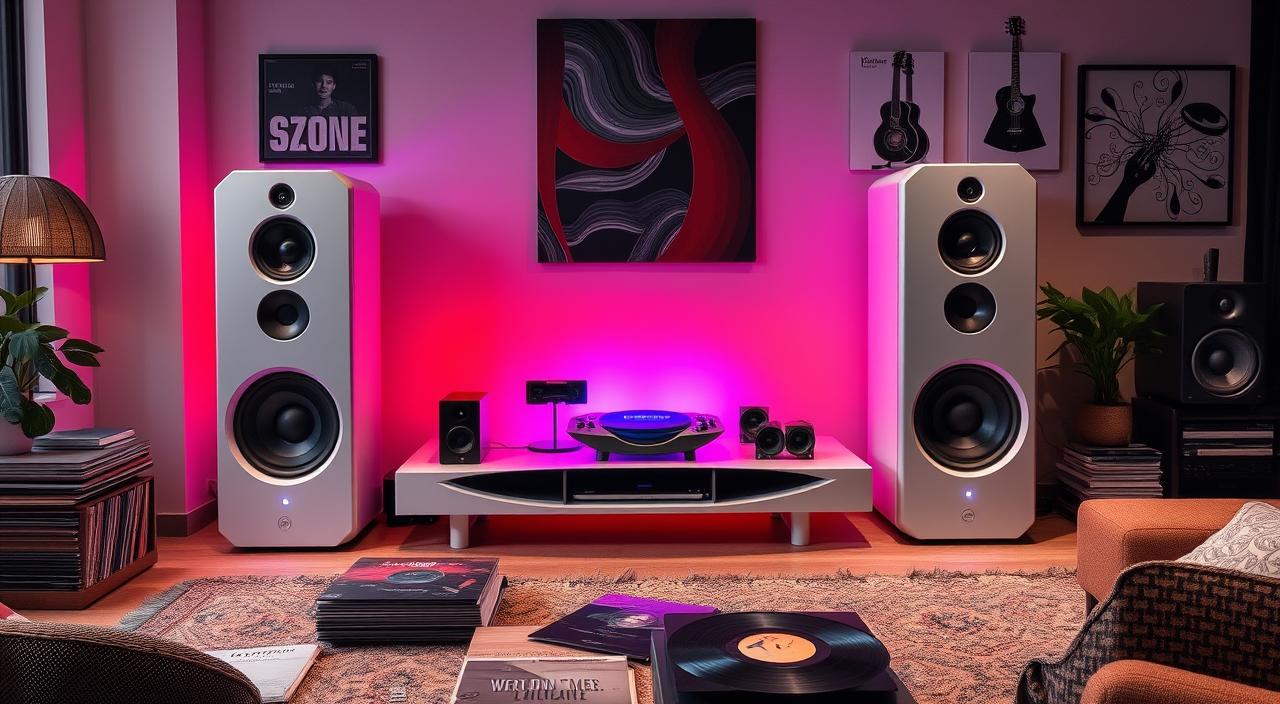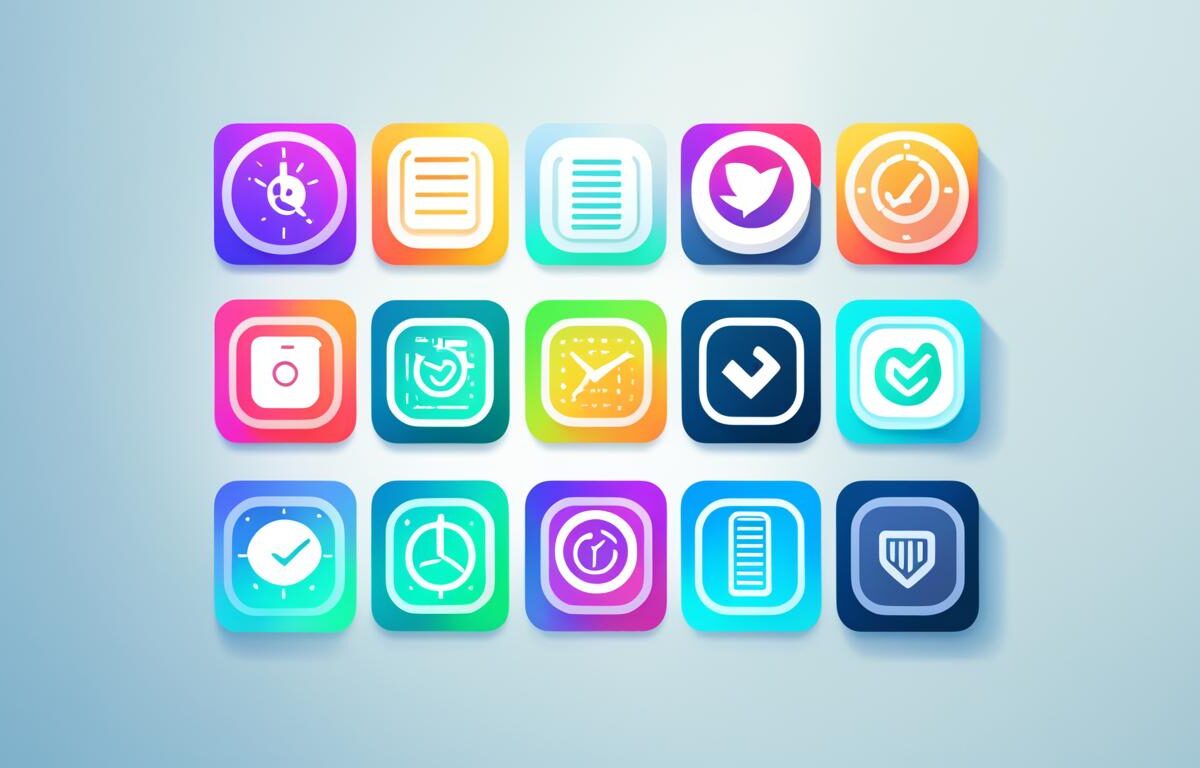The world of music is always changing, thanks to technology and creativity. But how much have audio advancements really improved our music experience? As music moves online, it’s clear that new audio tech is key to the future.
Technologies like virtual reality (VR) and augmented reality (AR) are changing how we listen to music. Dolby Atmos is also making a big difference. But what’s behind these changes, and how do they affect our connection to music?
The Impact of Immersive Technologies on Music
Immersive technologies like virtual reality (VR), augmented reality (AR), and mixed reality (MR) are changing the music world. They offer new ways for artists to create and share their music. Fans can now experience music in new and exciting ways.
These technologies are not just changing how music is made. They are also creating new ways for artists to make money and connect with fans.
Virtual Reality
VR lets people interact with virtual worlds and enjoy live music from anywhere. For example, The Weeknd’s “The Hills” remix with Eminem has gotten over 2.5 million views. This shows VR’s big impact on music.
Augmented Reality
AR lets musicians and fans add digital content to the real world. It makes live shows and album art more exciting. Marshmello x Crankdat’s “Falling To Pieces” has 1.9 million views, showing AR’s role in music.
Mixed Reality
MR mixes VR and AR to create a seamless blend of the real and virtual. It uses spatial audio and holographic visuals to change music experiences. Gorillaz’s “Saturnz Barz (Spirit House)” has over 15 million views, showing MR’s power.
Dolby Atmos is an audio tech that makes music feel three-dimensional. It’s being used in many music platforms. It creates a more immersive sound experience. Dolby Atmos and spatial audio are shaping the music industry’s future, helping artists connect with fans on a deeper level.
As these technologies grow, they will change how music is made, shared, and experienced. They will open new paths for artists and fans to connect in ways we’ve never seen before.
The Evolution of Digital Music Production
The music industry has changed a lot with digital technologies. Digital Audio Workstations (DAWs) have changed how we make, record, and mix music. Now, anyone with a computer can make professional-quality music. DAWs like Ableton Live, Logic Pro X, and Pro Tools are key for musicians and producers.
Virtual Studio Technology (VST) is also key in digital music production. VST lets us add virtual instruments and effects to our recordings. This has opened up new creative paths for music creation and audio engineering. It has made the industry more open, letting independent artists explore new sounds.
Digital Audio Workstations (DAWs)
The first digital audio tape recorders came out in 1977 by Soundstream. The first DAW was released in the mid-70s, with only 18 devices sold. Since then, DAW technology has grown a lot. Now, we have software like Cubase, ProTools, and Ableton Live that’s easier to use.
Virtual Studio Technology (VST)
Virtual studio technology (VST) is a big part of music production software today. VST lets us add virtual instruments and effects to our recordings. This has made it easier and cheaper to make music.
Thanks to digital tech, more artists can make music and share it worldwide. The future of digital audio workstations and virtual studio technology looks exciting, with new tech like artificial intelligence and virtual reality.
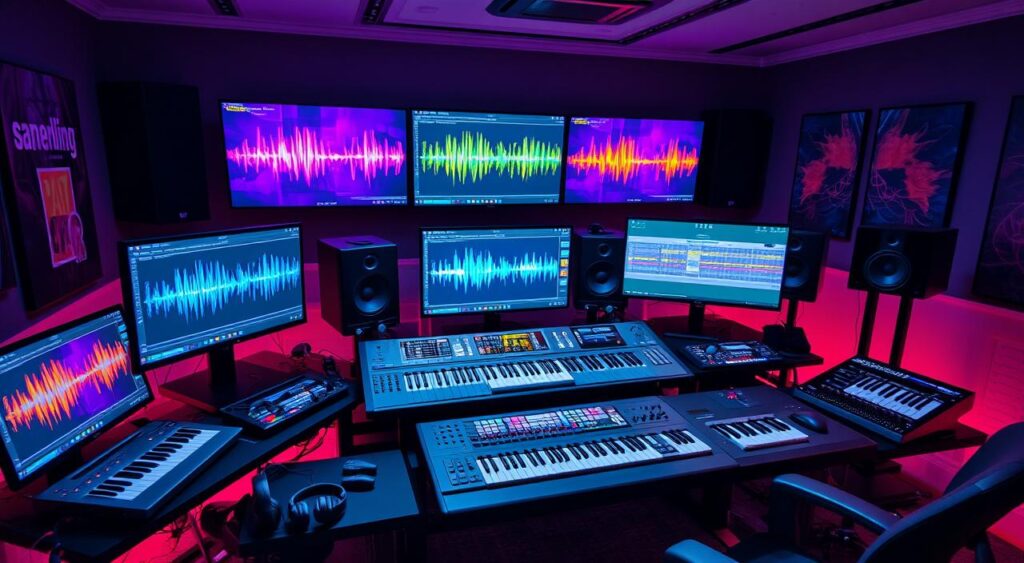
Dolby Atmos: Redefining Sonic Experiences
Dolby Atmos has changed how we enjoy music and movies. It was introduced in 2012. It makes sound feel real by placing it in a three-dimensional space.
Now, we can enjoy immersive audio at home, not just in theaters. Home theaters and soundbars with Dolby Atmos bring the cinema feel to our living rooms. Streaming services like Netflix and Disney+ also offer Dolby Atmos content, making it more popular.
“Dolby Atmos introduces a vertical dimension to sound, allowing it to move freely in three-dimensional space, creating unparalleled sonic immersion.”
Dolby Atmos is used in many fields. It’s key in video games for creating real sound environments. It also enhances the sound in movies and music.
In professional audio, Dolby Atmos makes sound mixing better. It makes movies and shows more engaging. It also changes how we enjoy music, from studio to live performances.
The future of Dolby Atmos and spatial audio is exciting. New technology and more content are coming. Dolby Atmos will keep changing how we enjoy music and movies.
Audio Technology and the Streaming Era
The rise of music streaming services has changed how we listen to music. Platforms like Spotify, Apple Music, and Tidal let us access millions of songs easily. They also give artists a chance to reach more people.
Music Streaming Services
Music streaming services are now a big part of our digital lives. They offer instant access to huge music libraries and personalized songs. With over 523 million subscribers worldwide in 2021, they’re very popular.
Connected Audio Devices
Connected audio devices, like smart speakers and wireless systems, have changed how we listen to music. They make streaming services easy to use and add features like voice control. Smart speakers are especially popular for playing music and getting news with just a voice command.
This mix of music streaming and connected devices has made listening to music better and more personal. As technology keeps improving, we can look forward to even more exciting ways to enjoy music.
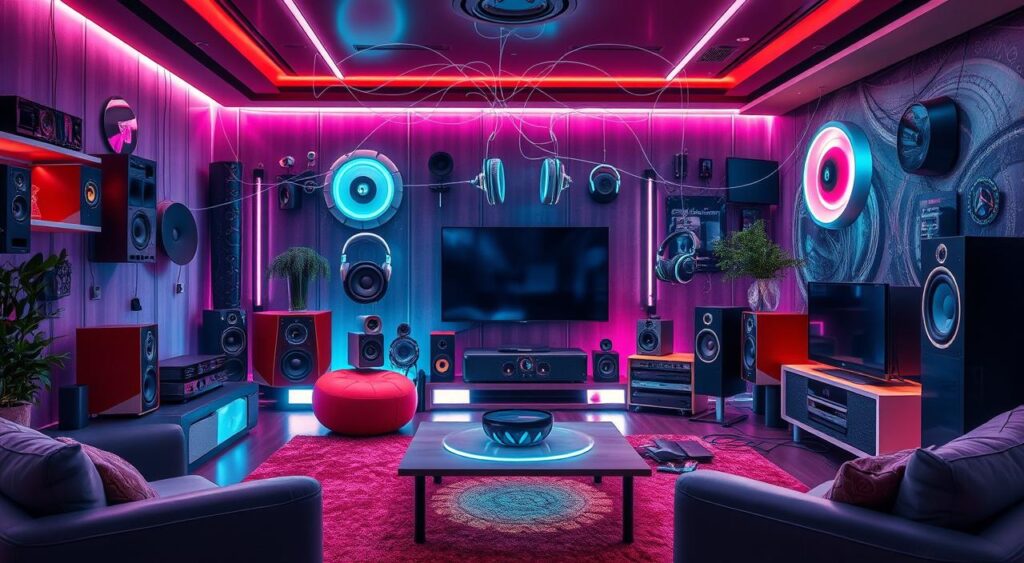
Artificial Intelligence in Music Creation
The music world is getting excited about artificial intelligence (AI). AI can make melodies, harmonies, and even whole songs. It’s not meant to replace human creativity but to help artists come up with new ideas.
AI software like Amper Music has made a viral song with AI versions of famous artists. This has caused a big stir on social media and in the news. It shows AI can quickly come up with new ideas, helping artists focus on making better music.
Streaming services like Spotify and Apple Music use AI to suggest songs based on what you like. This shows a trend towards music that’s more personal. But, there are worries about AI’s impact, like jobs being lost and music becoming too predictable.
Places like the Musicians Institute think combining human talent with AI is key for future music. AI tools are also helping to bring new sounds into music, thanks to partnerships between tech companies and music leaders. For example, Universal Music Group and YouTube have started a Music AI Incubator.
As AI becomes more involved in music, it brings both chances and challenges. Finding the right balance between AI’s creativity and human touch will be important for music’s future.
| AI in Music Creation | Advantages | Challenges |
|---|---|---|
| Amper Music’s AI-generated viral song | Quickly generates new ideas and variations | Potential job loss in the industry |
| Streaming service AI algorithms | Personalized music experiences | Risk of music becoming formulaic and predictable |
| AI-driven virtual instruments and songwriting tools | Catalyzing sonic innovation | Balancing AI with human creativity and intuition |
“Combining human skill and experience with AI technology is crucial to create the best music for the future.”
Audio Technology Innovations in Live Performances
The world of live music has changed a lot thanks to new audio technology. Now, concerts are more immersive and gadgets help musicians perform better. These changes make shows more exciting for both artists and fans.
Immersive Concert Experiences
Technologies like virtual reality (VR) and augmented reality (AR) are changing concerts. Fans can wear VR headsets and feel like they’re on stage. AR brings stunning visuals that mix with the live show, making it unforgettable.
Audio Gadgets for Musicians
New audio gadgets have also changed live music. Wireless mics, in-ear monitors, and advanced sound systems improve sound quality. They also let artists move freely on stage, making shows more engaging and polished.
As the concert world keeps growing, these audio tech advancements will make live music even better. They will draw in more fans and let artists explore new ways to perform.
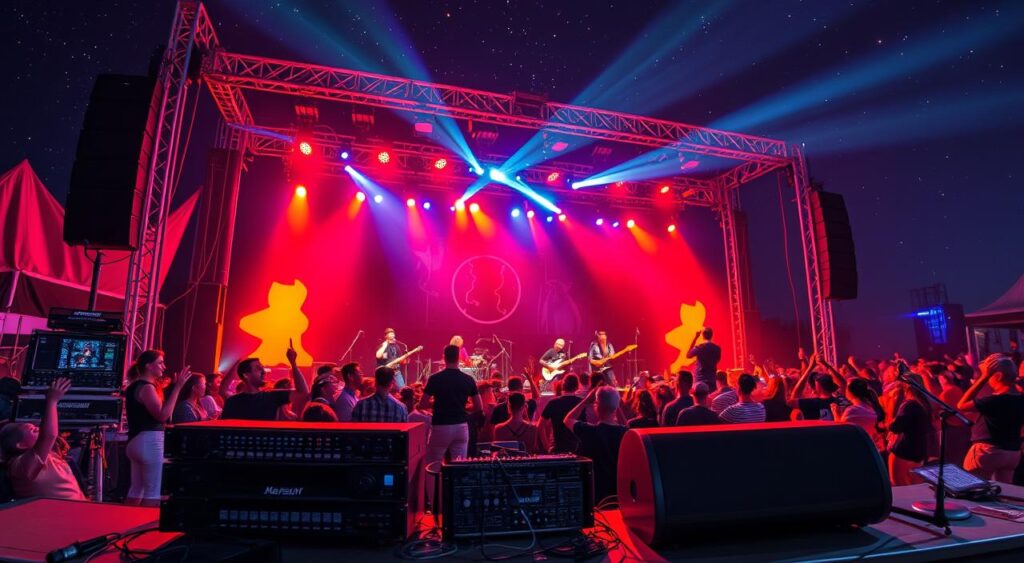
“The future of live music lies in the seamless fusion of cutting-edge audio technology and the timeless art of performance. These innovations are paving the way for a new era of immersive, visually stunning, and sonically captivating concert experiences.”
The Future of High-Fidelity Sound
The music world is changing fast, and high-fidelity audio is key. New tech like lossless streaming and top-notch audio gear lets fans hear music in new ways. The future looks bright for sound that feels real and immersive.
More people want high-fidelity speakers now than ever before. Sales have jumped 20% in five years. A big 75% of music fans say these speakers are essential for their home sound.
Wireless speakers are getting more popular, with a 30% sales boost in a year. Smart speakers are also in high demand, growing 25% each year. Companies are spending 15% more on research to make these speakers better.
New tech like variable bitrate encoding and MQA has changed streaming for the better. Today, “high fidelity” means great sound and feeling connected to the music.
“Wireless audio and streaming, especially from smartphones, have significantly improved the audio landscape,” says Brady Bargenquast, co-founder of Audioengine.
Looking ahead, the quest for perfect sound will keep driving the music world. With each new tech breakthrough, listeners will enjoy music in ways they never thought possible.
Audio Technology for Music Lovers at Home
Audio technology has changed how we enjoy music at home. Smart speakers and wireless systems have made our homes audio hubs. Now, we can have top-notch sound right where we live.
Smart Speakers: Hands-Free Music Enjoyment
Smart speakers like the Amazon Echo (4th Gen) and Google Nest Audio are big hits. They let you play music with just your voice. You can listen to songs, playlists, and podcasts hands-free.
These speakers also support multi-room audio and Bluetooth. This makes enjoying music at home easier than ever.
Wireless Audio Systems: Untangling the Listening Experience
Wireless audio systems, including multi-room options, are also popular. Devices like the JBL Charge 5 and Tribit StormBox Micro play music without cables. They let you stream music from your phone or services like Spotify.
This tech has made home audio better. It lets music lovers create their own sound spaces. As it keeps improving, our home audio will get even better.
Audio Technology
The world of music has changed a lot thanks to audio technology. From the first phonograph to digital audio workstations, it’s all new. Now, music creation, sharing, and listening are different.
Valencia College’s Sound and Music A.S. Degree program is all about audio tech. It covers Audio Engineering Technology, Music Production, and Sound Production. Students learn the skills needed to succeed in the music world.
- The Audio Engineering Technology specialization needs 64 credit hours. You’ll learn about sound, music theory, and electric circuits.
- After graduating, you can work as a music producer, technical director, sound engineer, or audio technician.
- Valencia College also gives credit for certain college programs and industry certifications. This makes it easier to start your audio career.
At the University of Silicon Valley (USV), there are many chances to learn about audio technology and music production. They offer a Bachelor of Science in Digital Audio Technology and other programs. These give you the training and experience you need.
The audio technology world keeps getting better, offering new ways to make and enjoy music. As it grows, audio tech will play an even bigger role in shaping music’s future.
“Audio technology has revolutionized the way we create, consume, and interact with music. It’s an exciting time to be a part of this dynamic industry.”
The Business of Digital Entertainment
The music industry has changed a lot with digital technology. Now, artists, labels, and fans have new chances to succeed. Using audio technology wisely is key to the industry’s growth.
New Revenue Streams
Streaming services, social media, and new tech have brought in fresh money-making ideas. Streaming lets artists reach people all over the world. Social media helps artists talk directly to fans.
Also, things like virtual concerts and special merchandise can make more money. They help artists connect with fans in new ways.
Fan Engagement Strategies
Fans are now more important than ever in the music world. Artists and labels use tech to make their fans feel special. They do things like fun social media contests and secret content.
These digital tools help artists build strong bonds with their fans. This loyalty is key to their success over time.
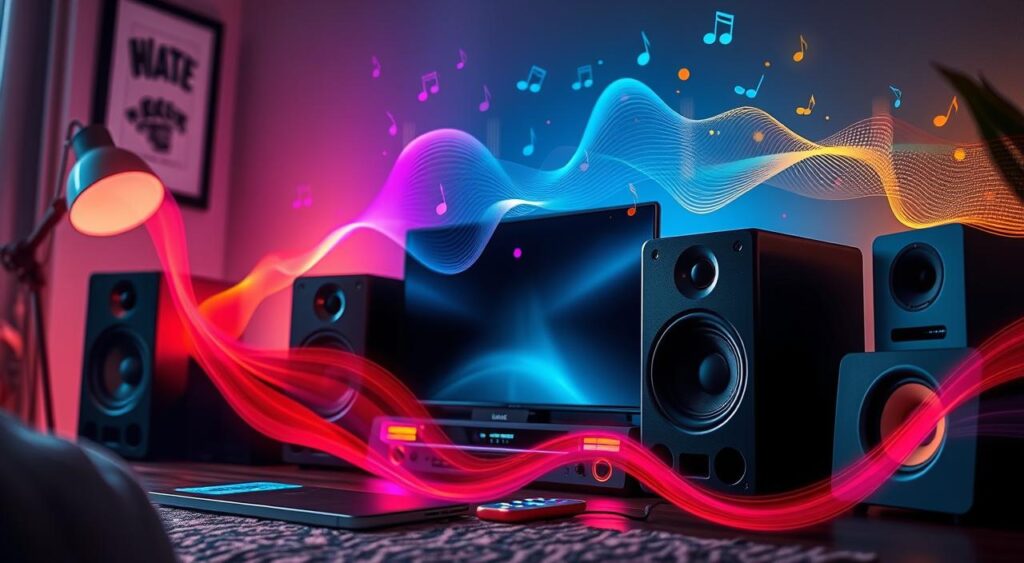
The digital entertainment world is always changing. Using audio technology is vital for the music business‘s future. By exploring new ways to make money and connect with fans, artists and labels can do well in this fast-paced music industry.
The Intersection of Music and Technology
The relationship between music and technology has led to a new era of creativity. Artists and producers use digital tools to blend traditional music with new tech. This mix has changed the music industry in big ways.
Creative Collaborations
DAWs and VST have made it easier for musicians to work together from anywhere. They can share ideas and create music that breaks new ground. This change has opened doors for independent artists to shine and explore new sounds.
Technological Influences on Genre
New tech has shaped music genres in exciting ways. It lets artists create sounds and experiences that were once impossible. With streaming and connected devices, artists can share their music in new and engaging ways.
“The intersection of music and technology has fostered a dynamic and symbiotic relationship, where creative collaborations and technological advancements have influenced the evolution of music.”
The music world has changed a lot thanks to digital tech. It has given artists, producers, and fans endless chances to be creative. As music and tech keep evolving, we can expect even more amazing sounds and experiences in the future.
Education and Careers in Music Technology
The music industry is changing fast, thanks to new audio technology. This means more jobs for people who know about music production, audio engineering, and music business. Getting a degree or certification in these areas can help you succeed.
These programs teach you about digital tools and the business side of music. You’ll learn about making money and connecting with fans. This knowledge opens doors to many careers, from making music to marketing it.
Music Technology Education
Many schools offer great music tech programs. For example, the University of Oregon has a Bachelor of Science in Music with a tech focus. They also have Master’s and Doctoral degrees in music technology.
Students get to work with the latest audio tech and team up with others in music, dance, and digital arts. This hands-on learning is key to success.
- The University of Oregon’s Future Music Oregon center has top-notch studios for exploring music and art.
- The Oregon Electronic Device Orchestra (OEDO) uses new tech for unique shows.
- The university also hosts the Summer Academy for Computer Music, welcoming students from China’s top music schools.
Careers in Music Technology
With a degree in music technology, you can do many things. You might work in audio mastering, software engineering, or even as a touring musician. You could also teach music, work in data science, or create music for films and games.
| Career Paths | Relevant Skills |
|---|---|
| Audio Mastering | Sound engineering, digital audio processing, music production |
| Audio Software Engineering | Computer programming, digital signal processing, user experience design |
| Touring Musician | Musicianship, live sound engineering, stage technology |
| Music Instruction | Music education, educational technology, music theory |
| Independent Creative Artist | Composition, sound design, multimedia integration |
Getting a degree in music technology prepares you for the digital entertainment world. It’s a chance to shape the future of music.
“The future of music is in the hands of those who embrace technology and use it to create new, innovative experiences for audiences.”
Conclusion
The music industry has changed a lot, thanks to new audio technology. We now have things like virtual reality and Dolby Atmos. These changes have made music creation, sharing, and listening better.
As music and audio tech keep getting better, we’re in for even more cool stuff. This could change how we enjoy music forever.
Keeping up with new audio tech is key for music fans and pros. It opens doors to new ways of making, sharing, and listening to music. This is a great time to be part of the music world.
With audio tech getting better, the music industry is set for big changes. We might see more music that fits our tastes, better virtual reality, and AI helping artists. This will make music more personal and exciting for everyone.

